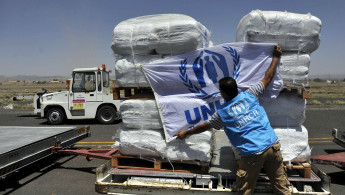UN declares highest-level emergency in Yemen
The United Nations on Wednesday declared its highest-level humanitarian emergency in conflict-torn Yemen, where over 80 percent of the population need assistance. UN officials have said the Arab world's most impoverished country is now a step away from famine.
Humanitarian chief Stephen O'Brien and UN agencies early Wednesday agreed to declare a "Level 3" humanitarian emergency in Yemen for six months.
| 80% of Yemen's population now needs humanitarian assistance |
The United Nations now faces four top-level humanitarian emergencies.
It is already trying to respond to "Level 3" emergencies in three other conflict-wracked countries: Iraq, Syria and South Sudan.
The UN says the declaration of a top-level emergency mobilises UN wide staffing and funding to scale up aid delivery.
Lat week, The UN Security Council urged all parties in the conflict to attend future peace talks and facilitate the immediate delivery of humanitarian aid.
A press statement approved by all 15 council members endorsed Secretary-General Ban Ki-moon's call for a humanitarian pause in the fighting.
Commercial cargo ships carrying food, fuel and other vital supplies must be allowed to reach ports in Yemen which is threatened by famine, the UN Security Council added.
The UN special envoy on Yemen, Ismail Ould Cheikh Ahmed, warned the council on Wednesday that the country is "one step" from famine.
Stephen O'Brien said that the collapse of basic services and extreme shortages of food and fuel have had a "devastating impact" across the country.
"More than 21 million people - that's 80 percent of the population - now need humanitarian assistance," he told reporters by videoconference from Germany.
"Health facilities report that over 2,800 people have been killed and 13,000 injured since the violence escalated in March. At least 1,400 civilians have lost their lives, and these numbers are likely to be significant underestimates."
The fighting in Yemen pits Houthi rebels and allied troops loyal to former President Ali Abdullah Saleh against southern separatists, local and tribal militias, Sunni Islamic militants and loyalists of President Abed Rabbo Mansour Hadi, who is now based in Saudi Arabia. The rebels seized the capital, Sanaa, in September.
Ahmed, who mediated talks between the parties in Geneva said that despite the deep divisions and failure to reach any agreement, "there is an emerging common ground" which he believes can lead to an eventual cease-fire.
The Security Council urged all parties to consider Ahmed's proposals for a humanitarian pause as a first step toward a sustainable cease-fire that would be monitored by "an international, impartial mechanism."
It urged the parties to engage in future talks without preconditions and reject violence to achieve their political goals.
The council said donors have provided only about 10 percent of the UN's humanitarian appeal for $1.6 billion to help those in need.





 Follow the Middle East's top stories in English at The New Arab on Google News
Follow the Middle East's top stories in English at The New Arab on Google News
![Israeli forces ordered bombed Gaza's Jabalia, ordering residents to leave [Getty]](/sites/default/files/styles/image_330x185/public/2176418030.jpeg?h=a5f2f23a&itok=_YGZaP1z)

